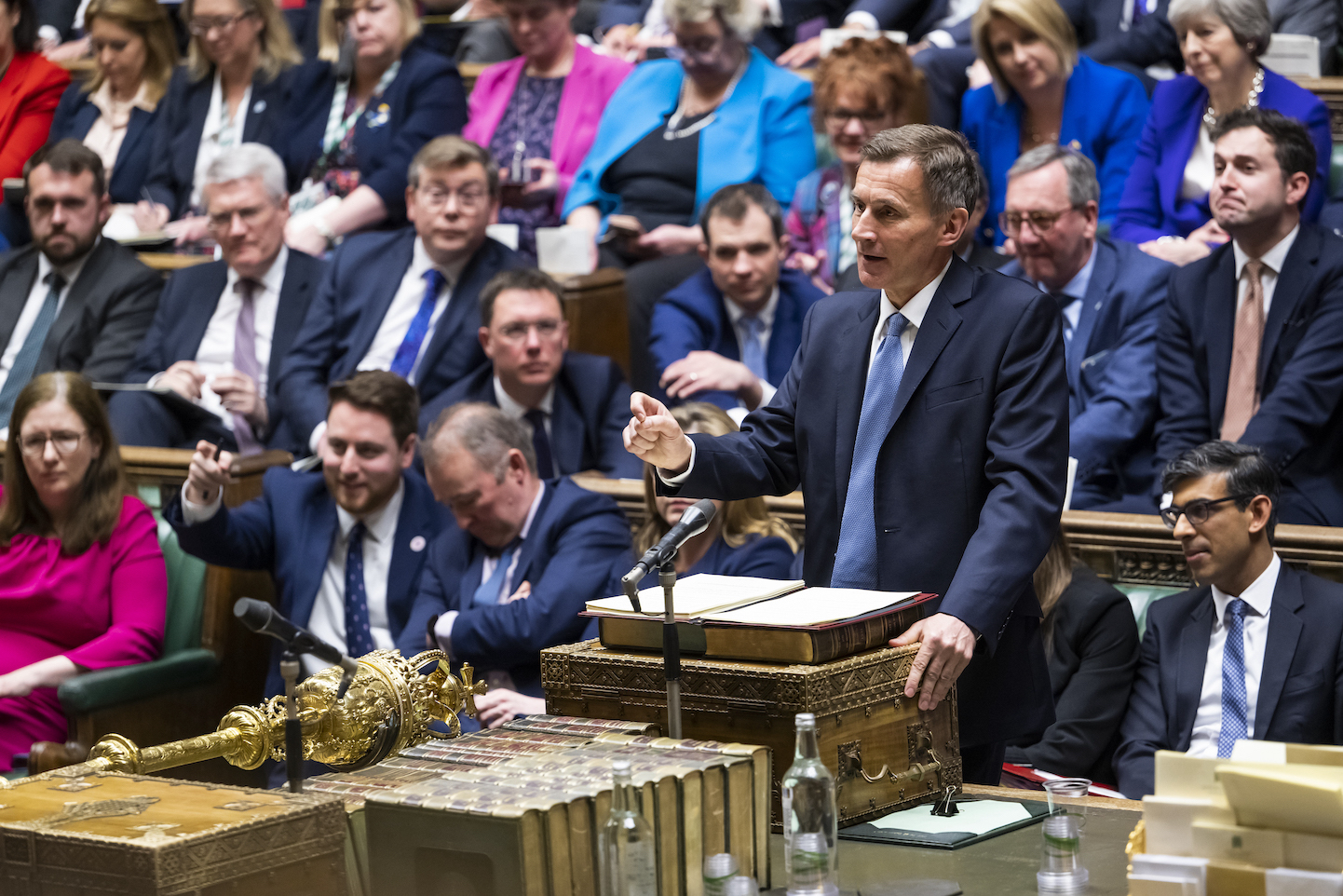In the Autumn Statement in November, Jeremy Hunt was the proud spokesperson of treasury orthodoxy. Outlining the most austere economic plan announced since George Osborne’s “emergency budget” in 2011, the very presence of “spreadsheet Jeremy” sent well-telegraphed signals to Britain’s financier class. The government’s hedonistic flirtation with Trussonomics — lenders were assured — had been as fleeting as it was disastrous. Pessimistic fiscal contentiousness had won the day.
Something had changed, therefore, as the chancellor stood, speech-palmed before the commons yesterday. As part of this latest fiscal blitz, the chancellor was dolling out £21 billion, funded by yet more borrowing and putting the government within a hair’s breadth of its own fiscal rules. Forget technocratic tedium, spring had sprung with a new activist chancellor in No 11.
“The declinists are wrong, and the optimists are right”, trumpeted Hunt in a bid to rile up his backbench colleagues. The chancellor wasted no time in detailing the Office of Budget Responsibility’s latest prediction which puts the UK on track to avoid “a technical recession this year”. With the economy settling, the subtext read, the government was turning its attention to growth on Conservative terms.
Hunt’s big surprise was the abolition of the lifetime allowance, dubbed the “doctors tax”, in what was a clear concession to the Conservative’s tax-cutting caucus. Pitched as a key measure in a “get back to work” budget, Hunt was scrapping the limit on the amount of cash workers can accumulate in pensions savings before having to pay extra tax.


But the measure will only “work” for 7,000 people and cost the Treasury £1 billion a year by 2027/8. The obvious political risk is that new tax incentives for the rich — during a round of public sector strikes — will come off as tone-deaf. Labour immediately slighted the policy as a bung to the well-off in a pointed and deliberate throwback to the debate over the “mini budget”.
Conversely, the political reward will come from within Conservative ranks. Hunt’s framing of the proposal was telling.
“Some have also asked me to increase the lifetime allowance”, Hunt declared, pricking the attention of Conservative colleagues. “But I have decided not to do that. Instead I will go further and abolish the lifetime allowance altogether”.
The rhetorical drum-roll mirrored, almost exactly, Kwasi Kwarteng’s flourish before pronouncing on the abolition of the 45p rate of income tax back in September.
“Take the additional rate of income tax”, Kwarteng declared in September. “But I’m not going to cut the additional rate of tax today, I’m going to abolish it altogether”.
On a scale of “mini budget” to “Autumn Statement”, Jeremy Hunt’s latest fiscal contribution hence rests somewhere in the middle. The halfway house speaks volumes about the government’s new political positioning.
In some senses, the Spring Budget marks a new phase of Sunakian rule. Gone are the days when the government sought to reassure markets after September’s Truss-incited turmoil. Rather, this is a government intent on stealing Trussonomics’ most valuable tropes, adopting its advocates’ infamous fiscal framing. This was, after all, a “budget for growth”.
But the chancellor is still bound by important economic constraints defined, above all, by the target to cut inflation. It means the chancellor could not stand up to the despatch box and announce a new totalising tranche of tax-cutting. Still, the abolition of the lifetime allowance — alongside the announcement of new tax easements for businesses and investment zones (originally a Truss plan) — had an important political quality.
In short: Hunt had turned from reassuring markets to reassuring Trussite MPs.
It was probably telling that Labour barely figured at all in Hunt’s prolix, except for a few quips about saving Labour the “bother” of trying to work out what to say about tax. “They put them up, we cut them”, Hunt insisted. Of course, even this was a not-so-carefully-coded message to the backbenches, who giddily accepted the anti-Starmer goad.
Ultimately, the tax-cutting rhetoric, bolstered by the substantial pensions rejig, was designed to offset the short-term disappointment of the corporation tax hike from 19 per cent to 25 per cent. Nor was it lost on many that the impact of inflation will continue to push tax-payers into higher and higher tax bands.
Still, Hunt hopes that the hints of a new departure on fiscal policy will dampen backbench discontents as the government’s “delivery” blitz continues.
Hunt hence walked a fine line between fiscal heterodoxy and orthodoxy in this budget — delineated by the political reality of a party still gripped by Trussism. Most fiscal plans involve some sleight of hand, but Hunt’s approach to tax — coupled with the pilfering of Labour policy on childcare and energy support — shows this was a budget trickier than most.












